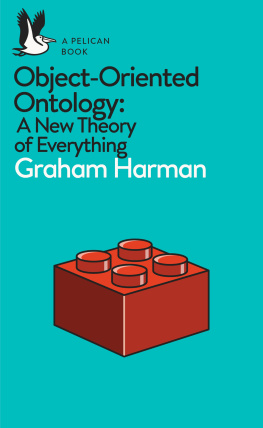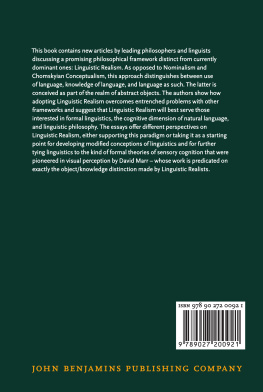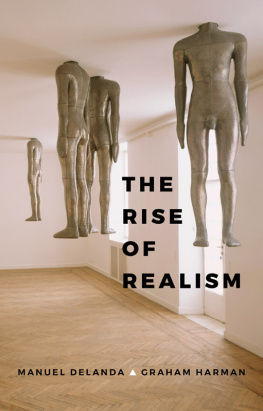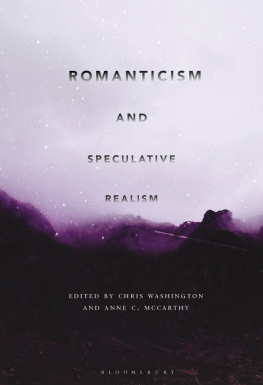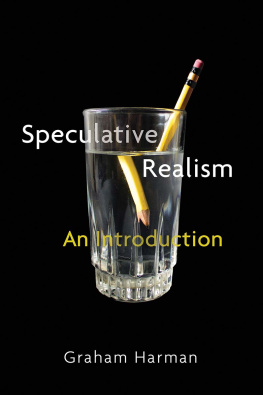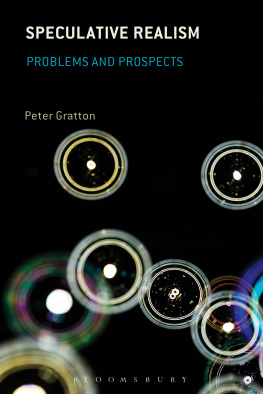Harman - Towards Speculative Realism: Essays &
Here you can read online Harman - Towards Speculative Realism: Essays & full text of the book (entire story) in english for free. Download pdf and epub, get meaning, cover and reviews about this ebook. year: 2010, publisher: John Hunt Publishing;O-Books, genre: Religion. Description of the work, (preface) as well as reviews are available. Best literature library LitArk.com created for fans of good reading and offers a wide selection of genres:
Romance novel
Science fiction
Adventure
Detective
Science
History
Home and family
Prose
Art
Politics
Computer
Non-fiction
Religion
Business
Children
Humor
Choose a favorite category and find really read worthwhile books. Enjoy immersion in the world of imagination, feel the emotions of the characters or learn something new for yourself, make an fascinating discovery.

Towards Speculative Realism: Essays &: summary, description and annotation
We offer to read an annotation, description, summary or preface (depends on what the author of the book "Towards Speculative Realism: Essays &" wrote himself). If you haven't found the necessary information about the book — write in the comments, we will try to find it.
Abstract: These writings chart Harmans rise from Chicago sportswriter to co founder of one of Europes most promising philosophical movements: Speculative Realism
Harman: author's other books
Who wrote Towards Speculative Realism: Essays &? Find out the surname, the name of the author of the book and a list of all author's works by series.
Towards Speculative Realism: Essays & — read online for free the complete book (whole text) full work
Below is the text of the book, divided by pages. System saving the place of the last page read, allows you to conveniently read the book "Towards Speculative Realism: Essays &" online for free, without having to search again every time where you left off. Put a bookmark, and you can go to the page where you finished reading at any time.
Font size:
Interval:
Bookmark:
Contemporary culture has eliminated both the concept of the
public and the figure of the intellectual. Former public spaces
both physical and cultural - are now either derelict or colonized
by advertising. A cretinous anti-intellectualism presides,
cheerled by expensively educated hacks in the pay of
multinational corporations who reassure their bored readers
that there is no need to rouse themselves from their interpassive
stupor. The informal censorship internalized and propagated by
the cultural workers of late capitalism generates a banal
conformity that the propaganda chiefs of Stalinism could only
ever have dreamt of imposing. Zer0 Books knows that another
kind of discourse - intellectual without being academic, popular
without being populist - is not only possible: it is already
flourishing, in the regions beyond the striplit malls of so-called
mass media and the neurotically bureaucratic halls of the
academy. Zer0 is committed to the idea of publishing as a
making public of the intellectual. It is convinced that in
the unthinking, blandly consensual culture in which we live,
critical and engaged theoretical reflection is more important
than ever before.
This piece was a conference paper submitted in February 1997 to the Society for Phenomenology and Existential Philosophy (SPEP). The submission was rejected. Since 199192 I had placed the tool-analysis at the center of my interpretation of Heidegger, though at the time of writing this piece I was not yet a philosophical realist as was the case from December 1997 onward. Also missing from this essay is my later preoccupation with the role of das Geviert or the fourfold in Heidegger, though this concern was already paramount from as early as 1994 when his Einblick in das was ist1 was finally published in full. A few key phrases from the following paper later found their way into my first book, Tool-Being (2002).2
Few passages in Heideggers writings have attained as much notoriety as the analysis of equipment in Being and Time. It is impossible to find a summary of this work that does not make frequent reference to the vivid description of the tool and its malfunction. Still, the theme of equipment has rarely been pursued as a worthy problem in its own right. On one front, the concept of the tool is regarded as an early version of a later, fullblown meditation on the essence of technology. Elsewhere, one speaks of Heideggers pragmatist period; from there, a debate erupts as to whether or not this pragmatism has anything to do with the philosophers later concerns. A third camp, which includes many of the most reliable commentators, regards the tool-analysis as possessing a largely historical function, as a settling of accounts with the ancient poiesis/praxis distinction. But in each of these cases the real action is assumed to lie elsewhere, in one of the more remote and complicated themes of Heidegger studies. The current paper will argue against this tendency. First, we will show that Heideggers account of tools is applicable not just to widely-recognized examples of handymans tools (hammers, drills), but to every possible entity. Second, we will suggest that all of the more widely admired Heideggerian themes are derivatives of the philosophers simple analysis of utensils. Finally, we will make a tentative suggestion concerning the development of a concrete theory of equipment.
The analysis of equipment is familiar enough that any paraphrase quickly becomes tedious. Our primary mode of encounter with entities, Heidegger shows, is not that of running across entities indifferently present-at-hand for perception. When the tool is most a tool, it recedes into a reliable background of subterranean machinery. Equipment is invisible. Furthermore, tools do not occur in isolation. Their meaning is determined by their definitive role in a referential contexture, their distinct position in this reality. The same hammer can be magnificent against soft wood, useless against metallic surfaces, and a lethal horror to many insects. In this way, the tool is what it is only with respect to the system it inhabits; there is no such thing as an equipment. Equipment is total, or contextural. What this tells us is that equipment, insofar as it is currently in use, is never something merely present-at-hand. Some part of the physical tool may stay in view, but its action necessarily withdraws into a totality that cannot become visible in principle. The tool is the execution of a reality or effect that necessarily retreats behind the presence of any surface. But this reality is not merely negative, as though self-concealment were its most striking feature. The tool is a force that exists rather than not existing, a reality that has emerged into the world and set up shop. Of course in the strict sense we should speak here not of tools, but rather of a single unitary world in action. For at this point we are not yet in position to regard an individual piece of gear as anything but illusory, as an ontic nullity with respect to its underground reality.
Let these remarks suffice to remind us of the basic features of Heideggers innovative research concerning equipment. At the same time, we should not fail to notice that the scope of his analysis soon expands far beyond the limited number of objects normally classified as tools. Heidegger does not mean to talk about spoons and forks, as he will later point out on another occasion. Rather, every conceiveable entity is nothing less than an item of equipment. No being can be reduced to its presence-at-hand. The most useless flake of stone does not escape the system of tools; the tiniest grain of sand is what it is, surging into existence and throwing its weight around. No matter how negligible these entities are, they are not without their significance, even if for most humans it is the feeble significance of triviality. Beneath its indifferent surface every entity occupies a highly determinate position in the system of significance that forms the world. In short, the analysis of tools is concerned only incidentally with the human use of tools. Its real subject matter is the stance of entities themselves in the midst of reality. The bridge is not a bridge due to the fact that Dasein uses it; the reverse is the case. A tool isnt used; it is.
It will be objected that we have already missed the central significance of Dasein in this analysis. It will be claimed that Dasein is the key, since everyone knows that Being and Time is compromised by a transcendental standpoint in which human being is always taken as the final standard of reference. But there is a rarely noticed ambiguity in Heideggers use of the term Dasein. Admittedly, the human being is not the same kind of entity as a stone. Human beings partly transcend the entities that surround them, while the rock is merely the oblivious punching bag of the forces that mass against it. In more familiar terms, Dasein is gifted with an understanding of being. Ignoring for now the difficult problem posed by animals, the human being seems to be a unique entity in precisely this way. But there is another trait of Dasein, one that is mentioned in an even earlier passage: the fact that Daseins essence lies in its existence. Never meant to be sized up as a rational animal or as the fusion of body and soul, Dasein can only be understood in the very act of its existence. Any claim to define Dasein via some representation or eidos or by way of any external properties is incapable of living up to the task. But this irreducibility of Dasein to a representation is also shared by hammers, and even by sand and rocks. We have already seen that none of these entities can be understood as if they were simply
Next pageFont size:
Interval:
Bookmark:
Similar books «Towards Speculative Realism: Essays &»
Look at similar books to Towards Speculative Realism: Essays &. We have selected literature similar in name and meaning in the hope of providing readers with more options to find new, interesting, not yet read works.
Discussion, reviews of the book Towards Speculative Realism: Essays & and just readers' own opinions. Leave your comments, write what you think about the work, its meaning or the main characters. Specify what exactly you liked and what you didn't like, and why you think so.



